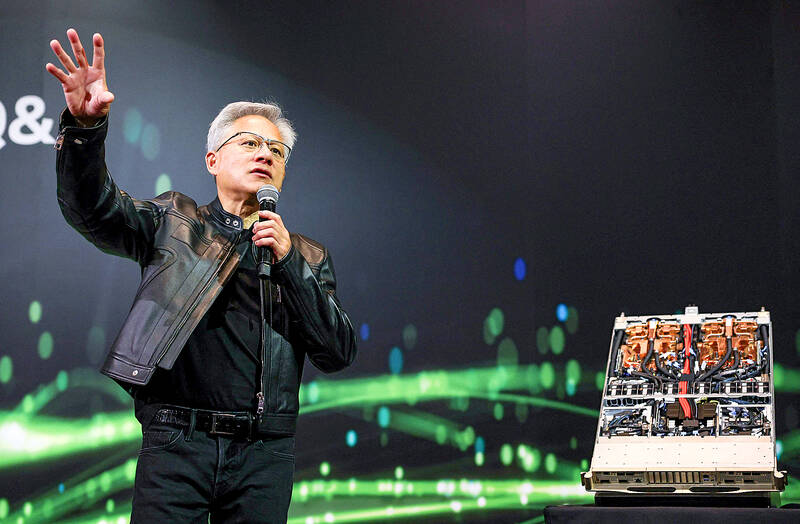The administration of US President Donald Trump on Wednesday said it would maintain efforts to keep advanced artificial intelligence (AI) technology out of China’s hands, brushing off calls from Nvidia Corp chief executive officer Jensen Huang (黃仁勳) to ease restrictions on chip exports to the world’s second-largest economy.
“We obviously have huge respect for Jensen,” Sriram Krishnan, White House senior policy adviser for AI, said in a Bloomberg Television interview.
“When it comes to inside China, I do think there is still bipartisan and broad concern about what can happen to these GPUs once they’re physically inside” the country, Krishnan said.

Photo: Cheng I-hwa, AFP
While the Trump administration still sees a security risk from widening AI chip exports to China, Krishnan said it agrees with Huang’s view that restrictions on a wide range of other US trading partners need to be revisited.
The Trump administration is rescinding and moving to replace an AI diffusion rule implemented by the administration of former US president Joe Biden that Krishnan said created “GPU haves and GPU have nots.”
“When it comes to the rest of the world, we want American AI stack starting from the GPUs to the models to everything on top,” Krishnan said.
“On that, Jensen and I and us are in agreement,” he added.
Krishnan spoke hours after Huang made his most forceful public comments to date against escalating US export restrictions aimed at China.
Speaking at the Computex industry conference in Taipei, Huang blasted the measures as a “failure” and urged the US to lower barriers to chip sales in China before US firms cede the market to rivals such as Huawei Technologies Co (華為).
Huang told reporters that China would account for a US$50 billion opportunity next year.

NEW IDENTITY: Known for its software, India has expanded into hardware, with its semiconductor industry growing from US$38bn in 2023 to US$45bn to US$50bn India on Saturday inaugurated its first semiconductor assembly and test facility, a milestone in the government’s push to reduce dependence on foreign chipmakers and stake a claim in a sector dominated by China. Indian Prime Minister Narendra Modi opened US firm Micron Technology Inc’s semiconductor assembly, test and packaging unit in his home state of Gujarat, hailing the “dawn of a new era” for India’s technology ambitions. “When young Indians look back in the future, they will see this decade as the turning point in our tech future,” Modi told the event, which was broadcast on his YouTube channel. The plant would convert

‘SEISMIC SHIFT’: The researcher forecast there would be about 1.1 billion mobile shipments this year, down from 1.26 billion the prior year and erasing years of gains The global smartphone market is expected to contract 12.9 percent this year due to the unprecedented memorychip shortage, marking “a crisis like no other,” researcher International Data Corp (IDC) said. The new forecast, a dramatic revision down from earlier estimates, gives the latest accounting of the ongoing memory crunch that is affecting every corner of the electronics industry. The demand for advanced memory to power artificial intelligence (AI) tasks has drained global supply until well into next year and jeopardizes the business model of many smartphone makers. IDC forecast about 1.1 billion mobile shipments this year, down from 1.26 billion the prior

People stand in a Pokemon store in Tokyo on Thursday. One of the world highest-grossing franchises is celebrated its 30th anniversary yesterday.

Zimbabwe’s ban on raw lithium exports is forcing Chinese miners to rethink their strategy, speeding up plans to process the metal locally instead of shipping it to China’s vast rechargeable battery industry. The country is Africa’s largest lithium producer and has one of the world’s largest reserves, according to the US Geological Survey (USGS). Zimbabwe already banned the export of lithium ore in 2022 and last year announced it would halt exports of lithium concentrates from January next year. However, on Wednesday it imposed the ban with immediate effect, leaving unclear what the lithium mining sector would do in the